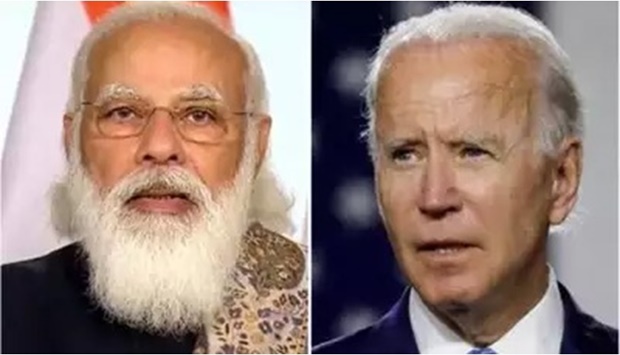President Joe Biden and Indian Prime Minister Narendra Modi had a “candid exchange of views” on the Ukraine crisis at a virtual summit yesterday, a senior administration official said, amid US frustration over New Delhi’s neutral stance on Russia’s invasion.
The hour-long talks were “warm and productive,” the official said, although Biden made no major demands of India and there was no indication of significant progress toward a unified posture on the conflict.
The South Asian nation has tried to walk a tightrope between maintaining relations with the West and avoiding alienating Russia, but has raised concerns in Washington by continuing to buy Russian oil.
Biden has been pressuring world leaders to take a hard line against Moscow, although the administration official said there was no “concrete ask and concrete answer” on energy imports during the meeting.
“We’ve been very clear that we’ve been able to ban oil and (gas) and coal imports from Russia, but other countries have to make their own choices,” she said.
“That said, we don’t think India should accelerate or increase imports of Russian energy and the US is ready to support India, remain in a conversation with India, about its diversification of imports.”
Biden began the meeting by saluting the “deep connection” between the two countries and said he wanted to continue their “close consultation” over the war, as Modi appeared alongside him on a large screen.
The Indian prime minister described the Ukraine crisis as “very worrying” and recalled that India had supported talks between Ukraine and Russia while delivering medical assistance to Kyiv.
Biden and Modi failed to reach a joint condemnation of the Russian invasion when they last spoke in early March at a meeting of the so-called “Quad” alliance of the US, India, Australia and Japan.
And New Delhi abstained when the UN General Assembly voted last week to suspend Russia from its seat on the 47-member Human Rights Council over allegations that Russian soldiers in Ukraine engaged in war crimes.
The US has already warned that any country that actively helps Russia to circumvent international sanctions will suffer “consequences.”
Yet this has not deterred India from working with Russia on a rupee-rouble payment mechanism to circumvent banking sanctions, while taking advantage of discounted oil prices offered by Russian producers.
Meanwhile India has bought at least 3mn barrels of crude from Russia since the start of the invasion on February 24, despite an embargo by Western nations.
Biden said on March 21 that India was an exception among Washington’s allies with its “somewhat shaky” response to the Russian offensive.
In the Cold War, officially non-aligned India leaned towards the Soviet Union — in part due to US support for Pakistan — buying its first Russian MiG-21 fighter jets in 1962.
According to experts, Russia remains India’s biggest supplier of major arms and India is also Russia’s largest customer.
Russian Foreign Minister Sergei Lavrov, who met with Modi in New Delhi in early April, lauded India for its approach to the conflict, and in particular for judging “the situation in its entirety, not just in a one-sided way.”
Biden and Modi also talked about ending the Covid-19 pandemic, countering climate change and bolstering security and democracy in the Asia-Pacific region, where India is seen as a critical counterweight to growing Chinese power.
The last confrontation between the Chinese and Indian militaries on the Line of Control, on the border of Tibet and the Indian region of Ladakh, flared up as recently as June 2020.
Biden was flanked by his defence and foreign ministers and their Indian counterparts, who were due to discuss Ukraine and China in person during the annual “2+2 Dialogue,” launched in 2018 to deepen co-operation between the two countries.
But another point of contention is likely to be India’s purchase of Russia’s S-400 missile defence system, which contravenes a US prohibition on countries from signing defence deals with Russia, Iran or North Korea.
The US sanctioned China in 2018 for buying the system but has not committed to doing the same for India.

Narendra Modi
